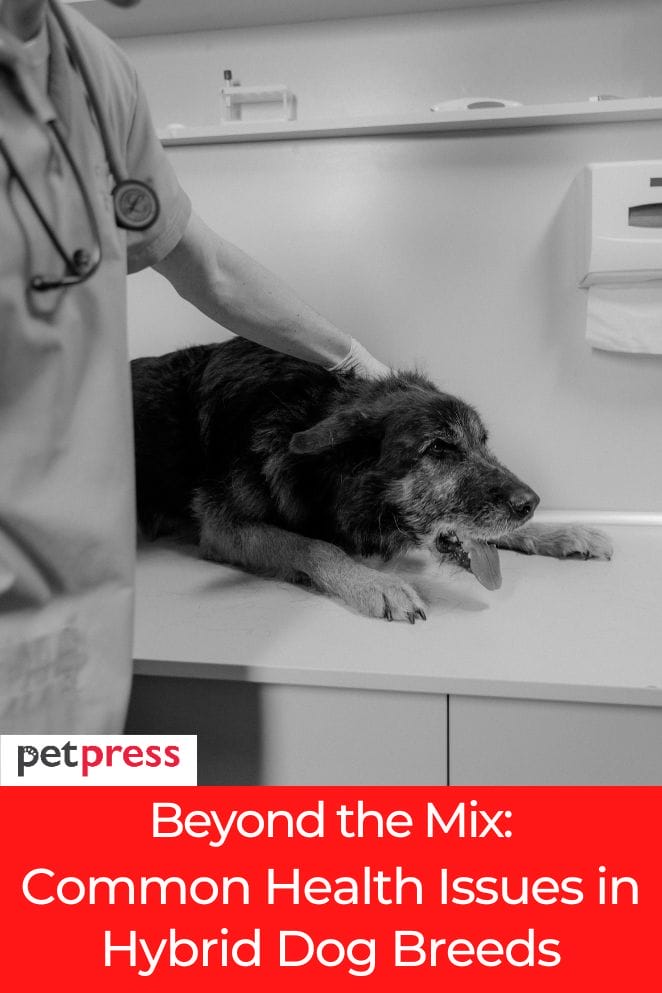
Hybrid dog breeds, also known as designer dogs, are a mix of two different purebred dog breeds.
These dogs have gained popularity in recent years due to their unique appearance and characteristics.
However, like any other breed, hybrid dogs can face health problems that may require special attention and care.
In this blog post, we will discuss the common health problems in hybrid dog breeds, provide tips for choosing a healthy hybrid dog, and offer advice on taking care of your hybrid.
Common Health Problems in Hybrid Dog Breeds
Hybrid dog breeds, which are a mix of two purebred dogs, can inherit health issues from both parent breeds.
These health problems can vary depending on the specific hybrid, but there are some common issues to be aware of:
Hip and elbow dysplasia
This condition affects the hip and elbow joints, causing them to develop abnormally.
It’s like the joint doesn’t fit together properly, leading to pain, difficulty moving, and eventually arthritis.
This can be quite painful for dogs and may require surgery or ongoing management with medication and physical therapy.
Epilepsy
Epilepsy is a neurological disorder characterized by recurrent seizures.
Hybrid dogs can be prone to epilepsy, which can manifest as sudden, uncontrollable shaking or convulsions.
While medication can often help manage seizures, it’s essential for owners to work closely with their veterinarian to find the right treatment plan.
Heart problems
Certain hybrid breeds, such as the Cavalier King Charles Spaniel, may be predisposed to heart conditions like mitral valve disease.
This can lead to issues like heart murmurs, fluid buildup, and reduced heart function.
Regular veterinary check-ups and screenings can help detect and manage heart problems early on.
Allergies
Just like humans, dogs can suffer from allergies too.
Hybrid dogs may develop allergies to food ingredients, pollen, dust, or other environmental factors.
Symptoms can include itching, redness, ear infections, and gastrointestinal upset.
Identifying and avoiding allergens, along with medications like antihistamines or specialized diets, can help manage allergic reactions.
Joint issues
Some hybrid breeds, like the Cocker Spaniel, are prone to joint problems such as luxating patella, where the kneecap slips out of place.
This can cause limping, pain, and difficulty walking.
Treatment may involve surgery to correct the issue or medications to manage pain and inflammation.
Eye problems
Hybrid dogs may inherit eye conditions from their parent breeds, such as cataracts, glaucoma, or progressive retinal atrophy (PRA).
These conditions can lead to vision impairment or blindness if left untreated.
Regular eye exams by a veterinary ophthalmologist can help catch and manage these issues early on.
Skin problems
Skin problems are common in hybrid dogs and can include issues like dermatitis, allergies, or infections.
Symptoms may include itching, redness, hair loss, or skin lesions.
Maintaining good hygiene, using hypoallergenic grooming products, and addressing any underlying allergies or infections can help keep your hybrid dog’s skin healthy.

Tips for Choosing a Healthy Hybrid Dog
When choosing a healthy hybrid dog, there are several important factors to consider to ensure you’re bringing home a happy and resilient companion:
Research the breeder
Take your time to find a reputable breeder with a solid reputation.
Look for breeders who prioritize the health and well-being of their dogs over profit.
A good breeder will be transparent and willing to provide health certificates for the parents of the hybrid dog, demonstrating that they have been screened for common genetic health issues.
Check the parents’ health
Inquire about the health history of the hybrid dog’s parents.
Knowing about any existing health conditions in the parent dogs can give you valuable insights into potential health concerns your hybrid may inherit.
Ensure that the parents have been screened for genetic diseases relevant to their breeds.
Consider the breed mix
Different hybrid combinations may have varying predispositions to certain health issues.
Research the specific breeds involved in the hybrid to understand their typical health concerns.
By knowing the potential health risks associated with each breed, you can better prepare for preventive care and potential veterinary interventions.
Ask about the dog’s upbringing
The early experiences and upbringing of a hybrid dog play a significant role in their overall health and behavior.
Inquire about how the breeder socializes and trains their puppies.
A well-socialized and well-trained dog is more likely to adapt well to different environments and have fewer behavioral issues, contributing to their overall health and happiness.
Visit the breeder
Whenever possible, visit the breeder in person to assess the living conditions and meet the hybrid dog and their parents.
Spending time observing the puppies’ behavior and interactions with their environment can give you valuable insights into their health and temperament.
Additionally, meeting the parents allows you to evaluate their overall health and temperament, which can be indicative of the future health and behavior of the hybrid.
Trust your instincts
Ultimately, trust your instincts when choosing a hybrid dog.
If something doesn’t feel right or if you have doubts about the breeder or the puppy’s health, it’s important to listen to your intuition and explore other options.
Bringing a new furry family member into your home is a significant decision, and ensuring their health and well-being should be your top priority.

Taking Care of Your Hybrid
Taking care of your hybrid dog involves several essential steps to ensure they lead a healthy and happy life:
Regular vet visits
Just like humans, hybrid dogs need regular check-ups to monitor their overall health and detect any potential issues early.
Schedule annual wellness exams with your veterinarian, during which they can conduct thorough physical examinations, administer vaccinations, and provide preventive care like parasite control and dental cleanings.
Proper nutrition
Providing your hybrid dog with a balanced diet tailored to their specific needs is crucial for their overall health and well-being.
Consult with your veterinarian to determine the best diet for your hybrid based on factors such as age, size, activity level, and any underlying health conditions.
Choose high-quality commercial dog food or consider preparing homemade meals with guidance from your vet or a veterinary nutritionist.
Exercise
Ensure your hybrid gets regular exercise to maintain a Regular exercise is essential for keeping your hybrid dog physically and mentally stimulated.
Aim for daily walks, play sessions, and interactive activities that cater to your dog’s breed and energy level.
Exercise helps maintain a healthy weight, strengthens muscles and joints, improves cardiovascular health, and prevents boredom and destructive behaviors.
Training
Proper training is essential for shaping your hybrid dog into a well-behaved and obedient companion.
Start training early to establish good habits and prevent behavioral issues from developing.
Focus on basic obedience commands like sit, stay, come, and leash walking, using positive reinforcement techniques such as treats, praise, and rewards.
Consistency, patience, and positive reinforcement are key to successful training.
Regular grooming
Maintaining a regular grooming routine is important for keeping your hybrid dog clean, comfortable, and healthy.
Brush your dog’s coat regularly to remove loose fur, prevent matting, and distribute natural oils.
Bathe your hybrid as needed using a mild dog shampoo formulated for their specific coat type and skin condition.
Trim their nails regularly to prevent overgrowth and discomfort, and clean their ears and teeth to prevent infections and dental problems.

Conclusion
Hybrid dog breeds make fantastic companions, yet it’s crucial to acknowledge the health concerns they might encounter.
Selecting a healthy hybrid, offering adequate care, and embracing a proactive approach can significantly contribute to your hybrid’s longevity and happiness.
FAQs
It depends on the parent breeds. Hybrids can inherit issues like hip dysplasia, respiratory problems (common in short-faced breeds), eye diseases, etc., depending on the parent breeds’ predispositions.
Yes! Hybrid vigor, the increased genetic diversity, can potentially reduce the risk of inherited diseases common in purebreds.
Provide good nutrition, exercise, and regular veterinary care, just like with any dog. Be aware of symptoms of potential health problems and schedule checkups.


GIPHY App Key not set. Please check settings